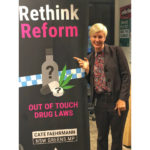As NZ Legalises Pill Testing Permanently, Australian MPs Watch the Death Toll Rise

New Zealand health minister Andrew Little announced on 9 April that the 12-month-long interim laws permitting legal pill testing at festivals will be made permanent prior to their expiration, as the services have been making a positive impact.
Passed in December, the Drug and Substance Checking Legislation Act 2020 permits appointed service providers to test any drug an individual presents at an event, as well as provide them with information about its contents and advise them on the potential harms.
Testing has been available at certain NZ festivals over recent years, which have been run by voluntary organisations, like KnowYourStuffNZ (KYSNZ).
Although, these services were operating in a legal grey area, with event organisers open for prosecution for knowingly providing a venue for illicit drug use.
Little outlined that after a summer of legal drug checking services it’s already apparent that their availability has been impacting people’s drug-taking behaviour, and it has also made it easier for “medical staff to treat people who have overdosed, because they know what they’re dealing with”.
But, despite numerous drug-related deaths and hospitalisations in this country, along with two successful government-sanctioned trials, a sustained campaign to implement these services and various recommendations from inquiries and coronial inquests, pill testing remains illegal over here.
The proof is in the testing
In its decision to legalise pill testing, the NZ government cited the findings of the Victorian University of Wellington’s Final Report into Drug Checking at New Zealand Festivals.
The report outlines that 68 percent of those surveyed who’d used a KYSNZ service reported having changed their behaviour afterwards. And of those, 87 percent outlined that their understanding of harm reduction had gotten better, with 53 percent stating it had substantially improved.
Medical professionals supported the introduction of drug checking at festivals as they reported often being confronted with patrons with unusual symptoms caused by unknown substances. And they added that young people were going to continue to take drugs regardless of their legal status.
Festival organisers were keen to see the law changed, as those who had engaged KYSNZ services had seen fewer serious drug-related incidents at their events. While KYSNZ volunteers noted they’d witnessed festivalgoers disposing of drugs that were found to be hazardous on testing.
In conclusion, the report states that there’s no evidence that pill testing services promote drug use or encourage those who haven’t used illegal drugs in the past to commence doing so, and the engagement medical staff have with patrons can lead to long-term behavioural change.
Since the 90s in Europe
According to the New York Times, New Zealand has become the second nation in the world to officially legalise pill testing. The first country to do so was the Netherlands in 1999, although drug checking services had been operating in its jurisdiction since 1992.
Pill testing has also been operating in numerous other European nations since the 90s, although this continues to be in a legal grey area. These countries include Austria, Belgium, France, Germany and Spain. Indeed, the European Union has produced pill testing best practice guidelines.
In a 2018 article in the Conversation, UNSW Drug Policy Professor Alison Ritter outlined the key benefits of pill testing.
These include altering the black market, as once dodgy drugs are identified it makes it difficult for dealers to keep peddling them. Following from there, ingredients used in drugs begin to match the types of substances that consumers are supposed to be buying, rather being mixed with adulterants.
Along with the potential to change the drug-taking behaviour of patrons who engage in a service, Ritter points out that the exchange also allows trained medical staff to consult with people who may be experiencing acute drug problems and have a conversation about options available to them.
Another key outcome of pill testing is that the data captured can be used to establish an understanding of what drugs are available on the street, and it allows for warnings to be sent out to the general public advising on specific batches of drugs that are hazardous.
Fatalities continue down under
Over the 13 months ending in November 2015, six young people died in drug-related circumstances at festivals nationwide. Health experts called for pill testing. Then NSW premier Mike Baird and his police minister Troy Grant were particularly opposed, maintaining it encouraged dealers.
With no harm reduction measures having been put in place, the 2018-19 music festival season saw five young people die in drug-related circumstances at NSW festivals. And as the death count grew over that summer, state premier Gladys Berejiklian consistently refused to even consider pill testing.
Instead, the Liberal leader buckled down on her government’s heavy-handed law and order approach. She convened an expert panel, which recommended tougher laws for drug suppliers. And she attempted to establish a festival licensing scheme that looked set to destroy the entire industry.
In having investigated the NSW five deaths, deputy state coroner Harriet Grahame released her findings in November 2019, which included a recommendation for the implementation of pill testing, along with another recommending the removal of drug dogs from festival sites.
Following an investigation into five drug-related deaths in Victoria between July 2016 and January 2017, that state’s coroner Paresa Spanos released her findings on 7 April, which again call for “the urgent implementation of public services that check the content and purity of illicit drugs”.
Pill Testing Australia held its second ACT government-sanctioned drug checking trial at Canberra’s Groovin the Moo festival in April 2019. At both its successful trials it detected potentially lethal substances, which their owners promptly placed in the amnesty bins provided.
The campaign for pill testing in this country has quietened down ever since the onset of the COVID-19 pandemic and the closure of events in relation to it.
However, people continue to take drugs with unknown contents at other locations, and when they overdose it doesn’t make the news. These drugs could be tested at permanent drug checking sites, like those that operate in the Netherlands.
Yet, unlike the progressive types found over the ditch in New Zealand, our major party politicians prefer to keep their heads buried firmly in the sand.







